Regional Conference Presidential Address
April 21, 2017 10:14 AM
Presidential Perspectives
President Jennifer Geiger shares her regional presidential address given at each regional conference this spring. Couldn’t make it or missed it? Check it out here. Also take a peek at this year’s regional conference highlights and mark your calendars for regionals in 2018!
Congratulations to each of the seven regions for putting together another year of excellent conference offerings. Kudos to the many volunteer hands that made them possible and to regional leaderships. Check out social media for tagged photos and updates from each of the regions. Each region can be found on Facebook and Twitter:
- Great Lakes Region @glr-amta #glr2017
- Mid-Atlantic Region @MAR-AMTA #maramta17
- Midwestern Region @MWR-AMTA #wrmwramta17
- New England Region @NER-AMTA #neramta17
- Southeastern Region @SER-AMTA #seramta17
- Southwestern Region @SWAMTA #swamta17
- Western Region @WRAMTA # wrmwramta17
Missed your regional or want to take another look at the AMTA Presidential Address? The PowerPoint slideshow and script are included below.
It was an honor and pleasure to join the combined conference of the Midwest and Western regions in Denver, CO. Their teamwork and efforts paid off! The same weekend, the Great Lakes Region met in Milwaukee, WI and the Mid-Atlantic Region conferenced through the snow storm in Rochester, NY. The following weekend, the Southwestern Region gathered in Ft. Worth, TX. The Southeastern Region met in beautiful Chapel Hill, NC on the same weekend that the New England Region braved the wet weather in Newport, RI. I was delighted to split my time between the two and celebrate with the Southeastern and New England Regions, though the time spent together was too short!
Each region has conference traditions and specialties, making the conference experience unique. Additionally, each region has already set dates for 2018, so plan ahead and mark your calendars:
- WRAMTA in Ontario, CA February 26- March 3
- MWR-AMTA in Iowa City, IA March 15-18
- SER-AMTA in Chattanooga, TN March 29-31
- SWAMTA in Lubbock, TX April 5-7
- GLR-AMTA in Ypsilanti, MI April 11-15
- MAR-AMTA in Pittsburgh, PA April 12-14
- NER-AMTA in Westbrook, CT April 19-21
2017 Regional Conference State of the Association Address
Jennifer D. Geiger, MA, MT-BC
Slide 1: Regional Conference Logos
This season, there were 6 regional conferences around the country for each of the 7 regions of AMTA, including a collaborative conference between the Midwestern and Western regions. Dedicated work of volunteers made these conferences possible.
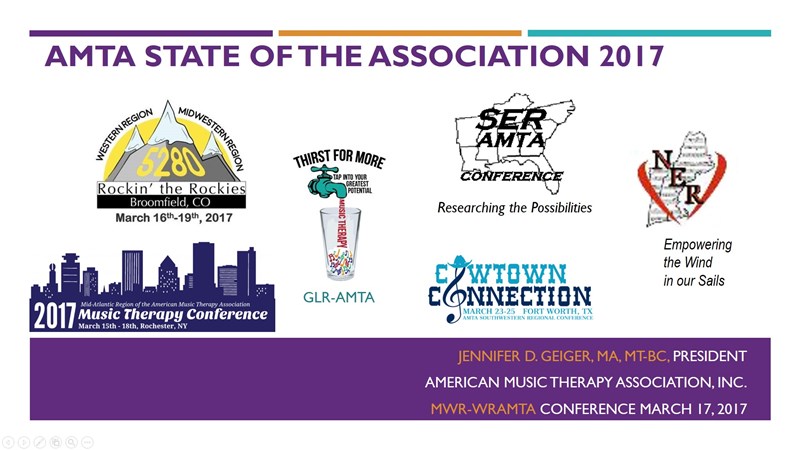
Slide 2: Regional Map
Regardless of where we work around the country, music therapists have needs that can be difficult to address by oneself and are better met by working together. This is the opportunity that AMTA provides: bringing together individuals with varied levels of experience, practice and expertise to continuously improve services to clients and their families and for the growth of the profession. Our foundation as an association leads to growth and collaboration, both of which help to move our profession forward.
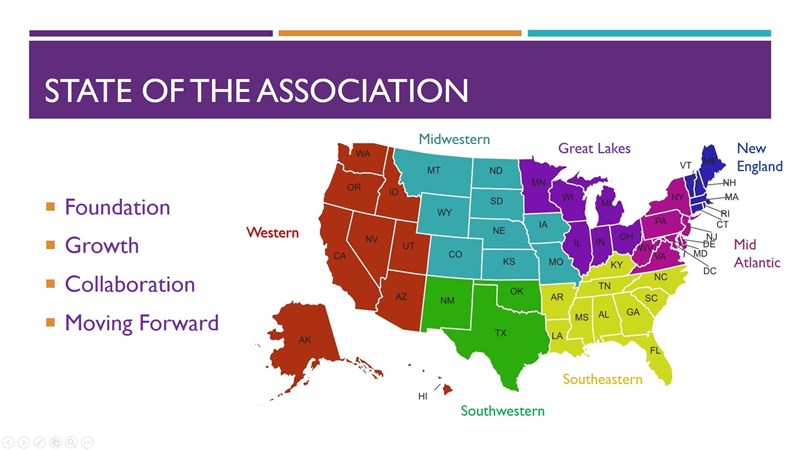
Slide 3: Mission
As always, the mission of the Association is both the foundation and at the forefront of decisions made by the AMTA Board of Directors. Promoting public awareness and increasing access to services is at the heart of our decisions. The rapidly changing world piece is also a serious consideration.
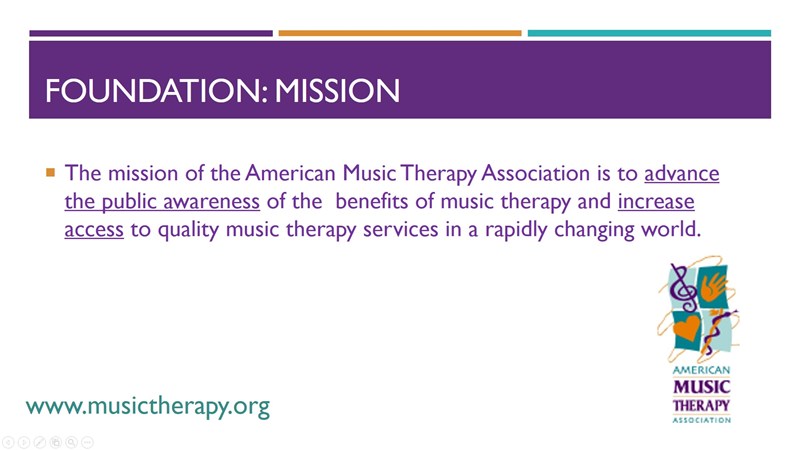
Slide 4: Structure
AMTA is the result of the work of passionate individuals who desired a single association to represent the music therapy profession. It is because of the dedicated individuals who laid this foundation that I can serve our profession. The work of the Association is addressed in many places. The Board of Directors makes decisions based on their fiduciary responsibility. Building on the needs of the membership, the Board charges the Committees, task forces and work groups with specific tasks. The Assembly of Delegates address decisions of policy. Making all these efforts possible is the dedication of the National Office Staff.
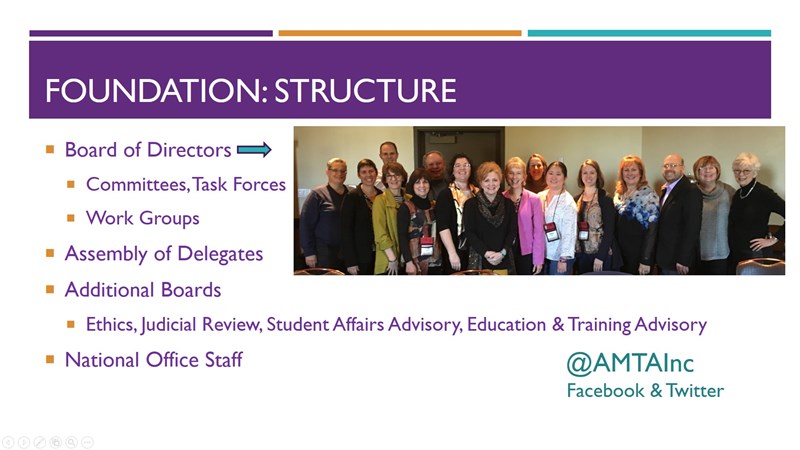
Slide 5: Students
And now, a shout-out to our STUDENTS! Congratulations to Past AMTAS President Rachel Pinto and the 2016 AMTAS officers for their excellent implementation of the FIRST ever National Passages at last year’s annual conference in Sandusky, Ohio. We welcome the 2017 officers working with AMTAS President Jamela Brown and Student Affairs Advisory Board Chair, Jeffrey Wolfe. I’ve observed that involvement in AMTA as a student tends to lead to involvement at the national level as well.
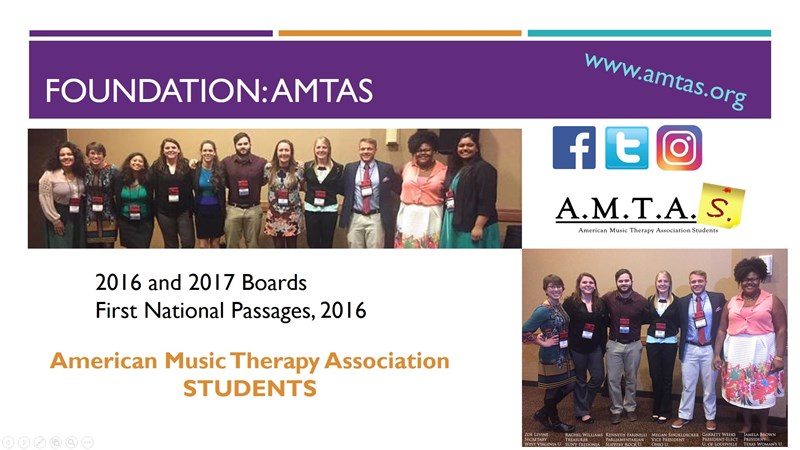
Slide 6: 2017 Slate of Nominees
Coming in November, AMTA members will have the opportunity – and responsibility – of electing new leaders on the Board of Directors: President Elect and Vice President Elect. The President Elect works closely with the President and Executive Director, engaging in leadership work and collaboration to continue the forward movement of the Association. The nominees for President Elect are Deb Benkovitz Williams and Jean Nemeth. The Vice President Elect works as an integral member of the conference planning team alongside the Vice President and National Office staff to produce top notch conference experiences. The nominees for Vice President Elect are Ed Kahler and Wendy Woolsey. The membership voted for a bylaw change to include the option of electronic voting. The Board is working on this, so stay tuned!
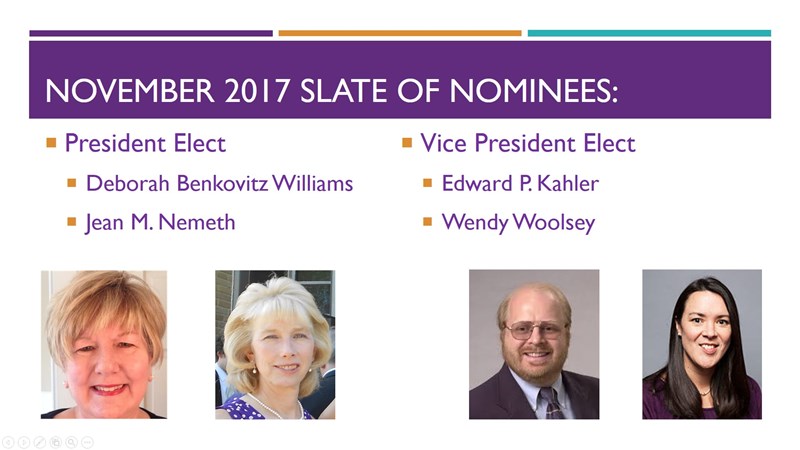
Slide 7: Financial
With AMTA’s tax-exempt status, we follow stringent guidelines, making for a consistently financially sound organization. Note that the fiscal year is different from the membership year. The current budget for this fiscal year is 1.8 million dollars. While we have budgeted for a $66,500 deficit, we anticipate being able to close that gap by generating an increase in membership and seeing Board projects come to fruition. For the past 2 years, we also budgeted for a deficit, but the actual numbers bore out a surplus due to the stringent financial planning and higher than expected conference revenue and membership numbers. To keep costs low for our members, Treasurer Clair is requesting that we all – each one of us – promote membership so that we can achieve a goal of having at least half of all practicing MT-BCs as members.
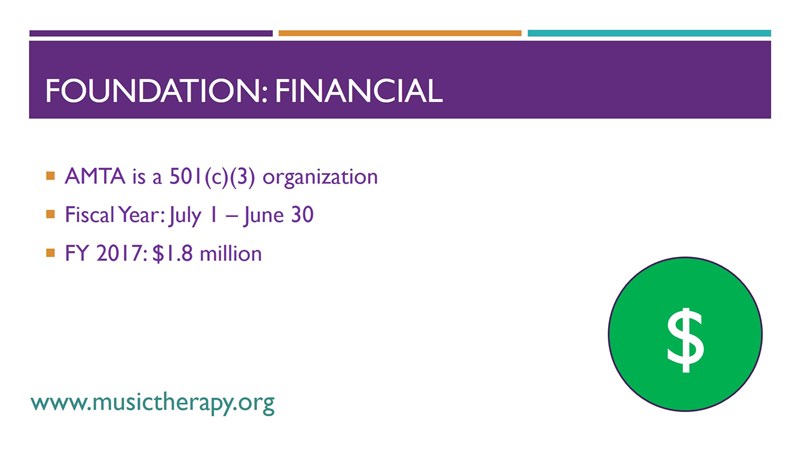
Slide 8: Membership
AMTA’s long-term financial health is due to the stringent management of resources, both human and monetary. While costs in all directions continue to climb, the National Office staff have maintained tight budgets for many years. The Board of Directors has recommended, and the Assembly has approved, dues increases 6 times since AMTA’s inception. Two years ago, we announced that merely one-third of practicing music therapists were AMTA members, yet all were benefitting from the services AMTA provides. While that ratio remains, the 2016 membership year ended with THE highest number of members in the history of AMTA and music therapy!
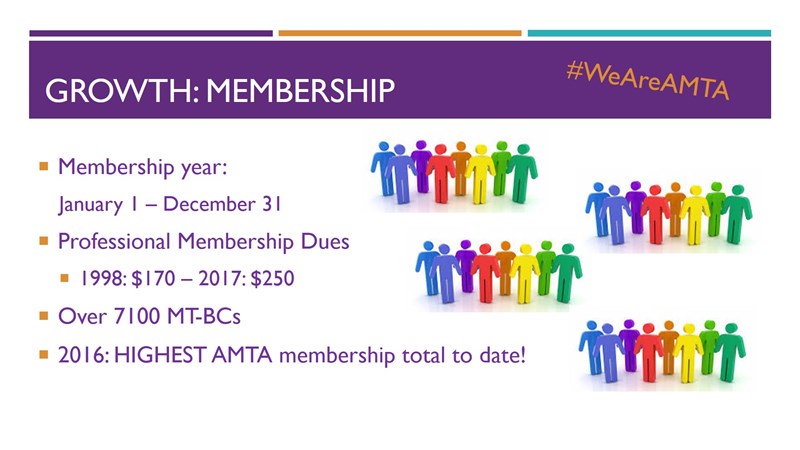
Slide 9: Education & Training
The number of academic programs continues to increase as the level of interest in the profession of music therapy is high. As the number of students increases, so does the number of internships needed and University Affiliated internships are increasing. A word of gratitude to the educators AND internship directors for their tireless efforts in educating and training our upcoming workforce. Kudos as well to the fieldwork supervisors who share their passion for the work that they do with interested students. Additionally, the library of podcasts under AMTA-Pro continues to expand and covers a variety of topics.
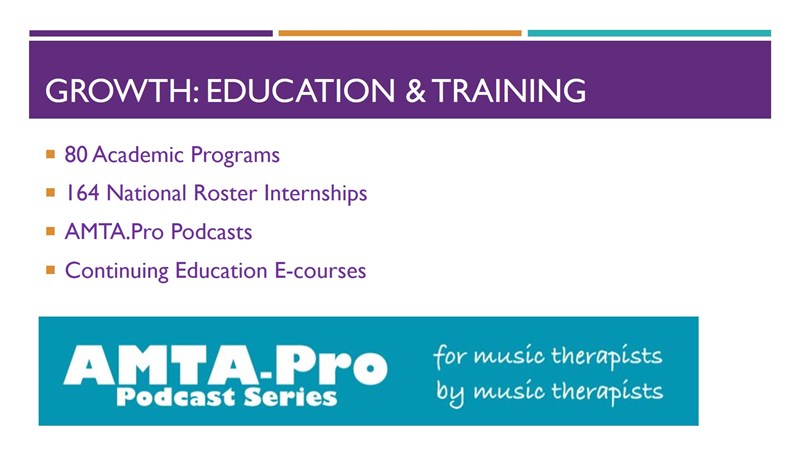
Slide 10: E-courses
AMTA’s self-study continuing education offerings continue to grow. Last year, AMTA was recognized by “Association Now” as providing the “Best Benefit Ever” to members and non-members alike for the FREE E-course on Disaster Response, valued at $125. This year, AMTA members receive the E-course on Self-Care, also valued at $125, as part of the comprehensive package of membership benefits. This equates to a total savings of $250 over the past 2 years! That’s like getting half-off the price of Professional Membership! The newest E-course is on music listening, provided by the expertise of the AMTA Music & Memory Work Group.
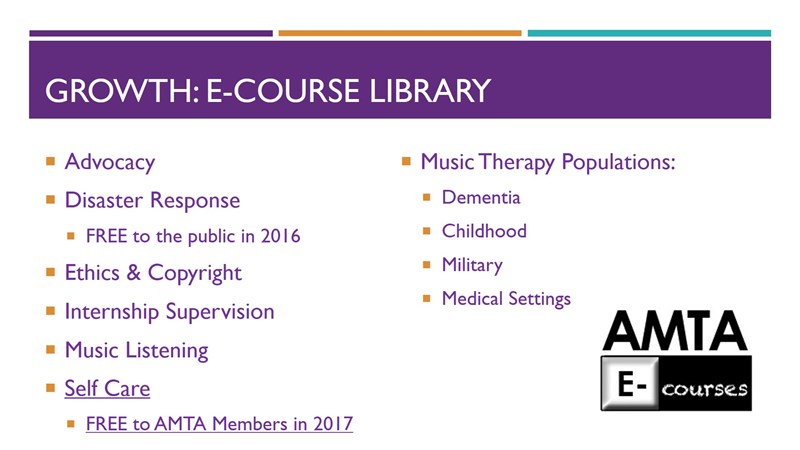
Slide 11: Publications
Exciting news regarding publications from AMTA: a third edition of “Music in Special Education” is on the horizon, as is a new, multimedia resource covering an “Introduction to Music Therapy.” This will be a cutting-edge resource for music therapy academic programs and students. A BIG thank you in advance for ALL the authors contributing to this effort!
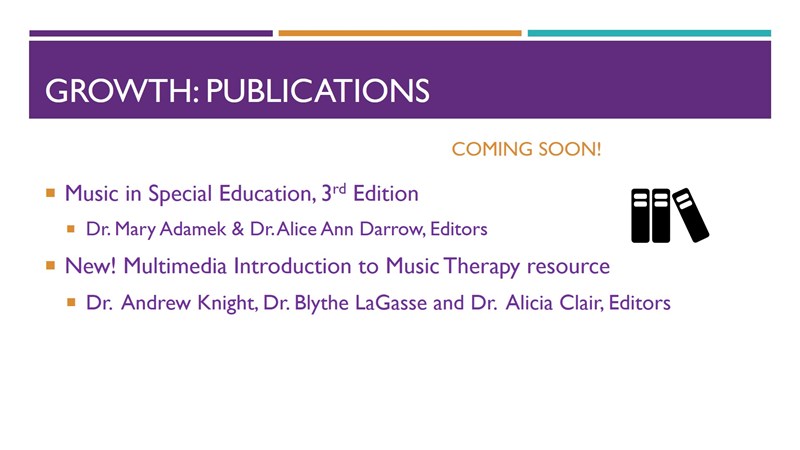
Slide 12: Research
The work begun by the attendees at the 2015 research symposium MTR2025 is moving forward. In addition to including the latest research in the education and training of new professionals, information is being presented at concurrent sessions at conferences. As clinicians, we are encouraged to use the information we review in our journals, in our daily practice. Thanks to Drs. Sheri Robb and Tony Meadows for the work they do in making information accessible via the journals. Because they will complete their term of service at the end of 2018, the search process has begun for the next Editors-in-Chief. Thanks to Mary Adamek and Michele Forinash for spearheading this effort.
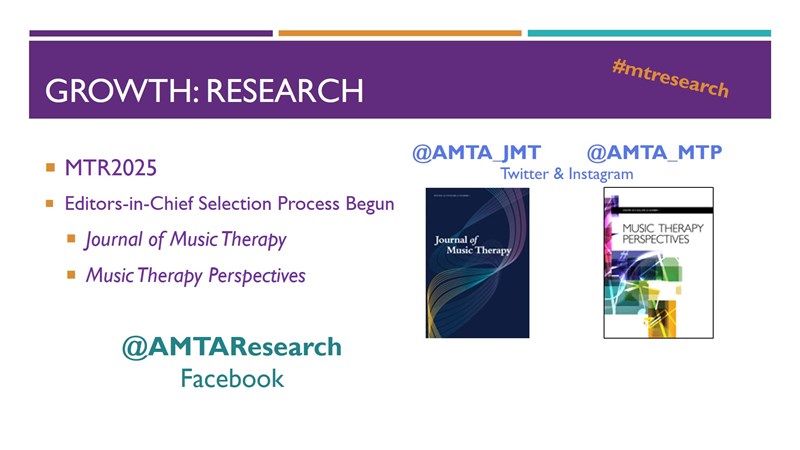
Slide 13: Screen Shots of OUP Platform
AMTA’s work with Oxford University Press has elevated the visibility of our journals and is making them accessible world-wide. Here is a look at the new platform. If you haven’t already, like and follow Twitter and Instagram accounts for @AMTA_JMT and @AMTA_MTP. On Facebook, “like” @AMTAresearch to follow this collaborative page. Related hashtags include #mtresearch as well as the handles #AMTA_JMT and #AMTA_MTP.
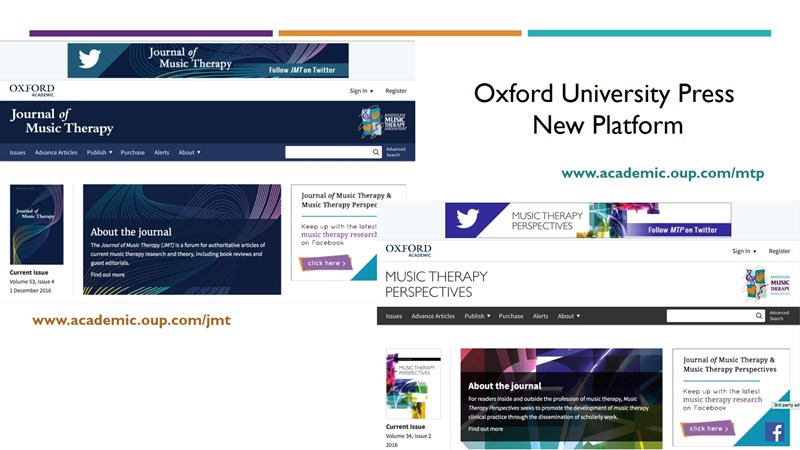
Slide 14: Advocacy Chart – Current State Recognition
AMTA and CBMT have collaborated on the State Recognition Operational Plan since 2005. The purpose of this joint national initiative is to achieve official state recognition of the music therapy profession and the MT-BC credential required for competent practice.
Improving consumer access to music therapy services and establishing a state-based public protection program to ensure that “music therapy” is provided by individuals who meet established education, clinical training, and credential qualifications is the plan. CONGRATULATIONS to Connecticut and Oklahoma on recognition in 2016!
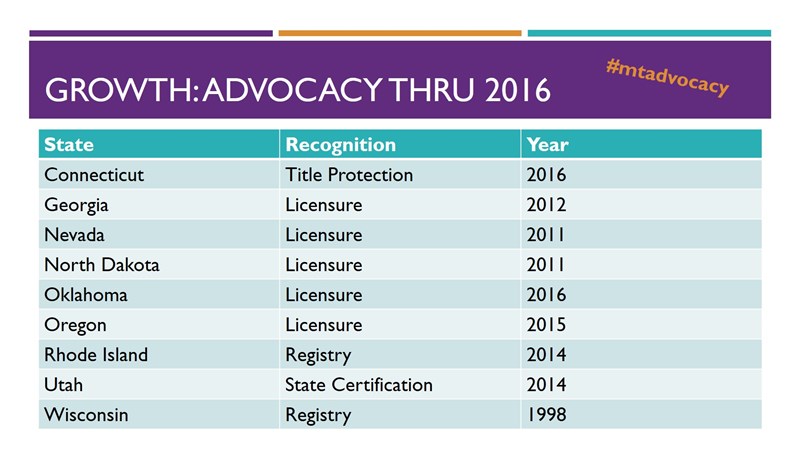
Slide 15: Current State Advocacy Efforts
This year, there are 45 state task forces working on state-based legislation. Here, we highlight the work. Shout out to Colorado, North Carolina, New York and Texas who are hosting Advocacy Breakfasts in conjunction with regional conferences. And to Minnesota and North Carolina who are representing Music Therapy at state Arts Advocacy days. Additionally, the following states are hosting advocacy events this season: Texas, Connecticut, Iowa, Maryland, Colorado, Florida, Pennsylvania and Washington.
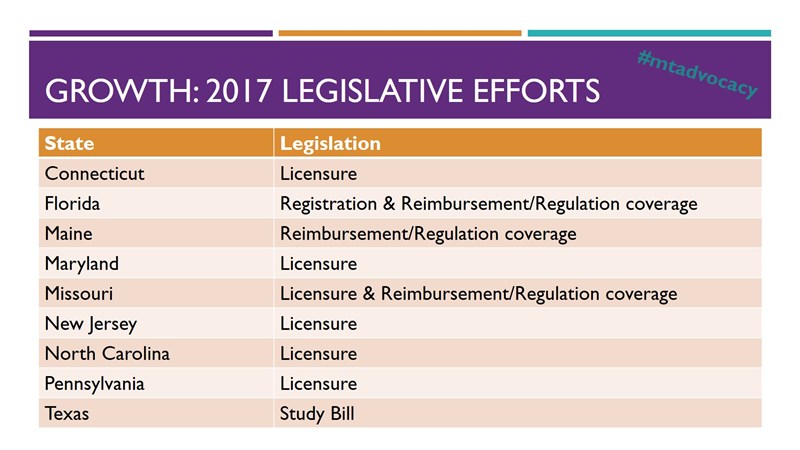
Slide 16: National Advocacy
I have been asked what AMTA is doing this year, with a new administration in Washington, D.C. If you have followed AMTA on social media or read the February edition of Music Therapy Matters, you know that AMTA has been involved in meetings and communications related to the needs of our clients in many areas. While this topic of advocacy is under “growth,” it is also at the foundation of our Association and profession. Continued advocacy allows us to grow.
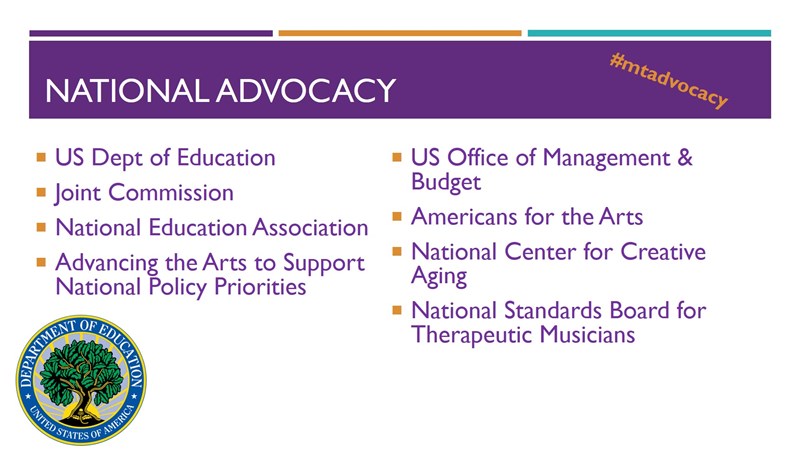
Slide 17: Collaboration: A Seat at the Table
We have the benefit of a dedicated staff member, AMTA’s Federal Analyst Rebecca Preddie, serving as an expert, in a variety of different areas, across populations and settings, a few listed here. Make no mistake – AMTA is at many a table, which is especially important during this time of change and challenge in our nation’s capital.
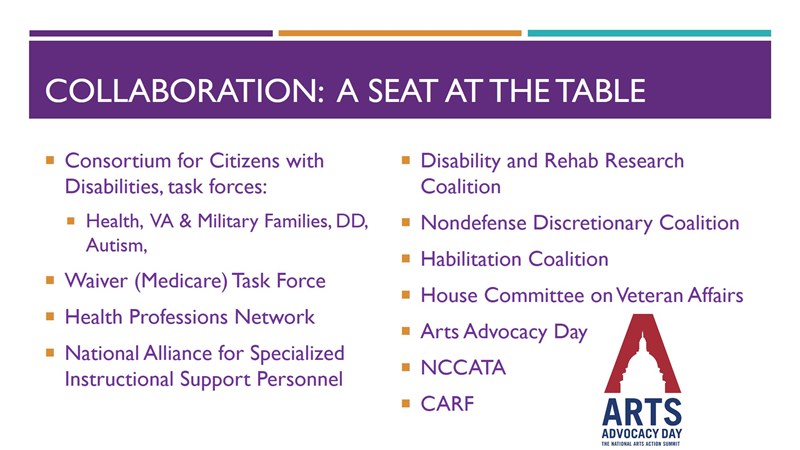
Slide 18: Collaboration: Military
AMTA’s involvement with the military has seen an increase in jobs for music therapists across the country. Conversations with various groups continue. If YOU are a government employed music therapist, I encourage you to become an AMTA member and join us in these important conversations.
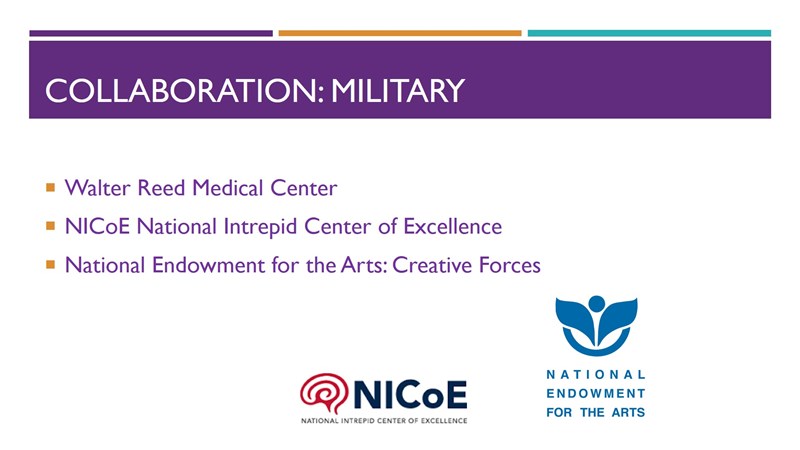
Slide 19: Moving Forward: NIH/Kennedy Center
An exciting collaboration occurred at the end of January. Attended by some 100 participants, the National Institutes of Health workshop included 25 panelists, of whom eight were music therapists: Joke Bradt, Christian Gold, Deforia Lane, Sheri Robb, Ed Roth, Elizabeth Stegemoller, Michael Thaut, and Connie Tomaino. Two keynotes were presented: one by Dr. Robb and one by Dr. Nina Kraus. AMTA National Office staff, Dr. Andi Farbman, Barbara Else, and Judy Simpson collaborated with planners to provide a comprehensive picture of music therapy research.
The Kennedy Center will be hosting an event— “Sound Health: Music and the Mind” on June 2nd and 3rd to increase public awareness of the importance and benefits of music and health, and intersections of neuroscience and music. A performance by the National Symphony Orchestra on June 2nd kicks off the two-day event. Watch for details on the musictherapy.org homepage.
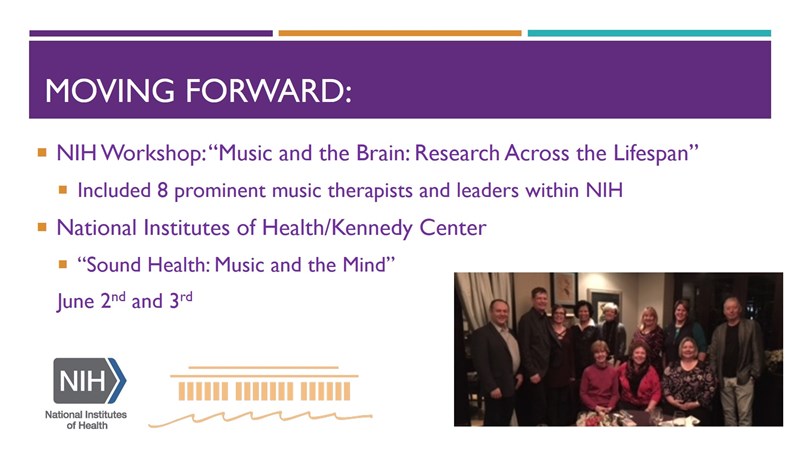
Slide 20: MLE
For nearly 20 years, there has been discussion about the possibility of entry into the music therapy profession at the Master’s level. The MLE Subcommittee was created in 2012 and added new members in 2015 to ensure regional representation. Analysis of last year’s survey sent to all program directors, faculty members and directors of National Roster and University Affiliated internships is ongoing. One item presents that overall functional piano skills were considered the weakest functional skill area by respondents to the survey, while functional vocal skills were considered the strongest. You can learn more by attending presentations at regional conference. Additionally, last year the Board approved working with Informs Pro Bono Analytics, a company that helps others make decisions. We are benefitting from outside experts in developing a decision-making model on this topic. This decision model will be unique to the question of master’s level entry and will be a tool for the subcommittee to use this summer as they continue their analysis.
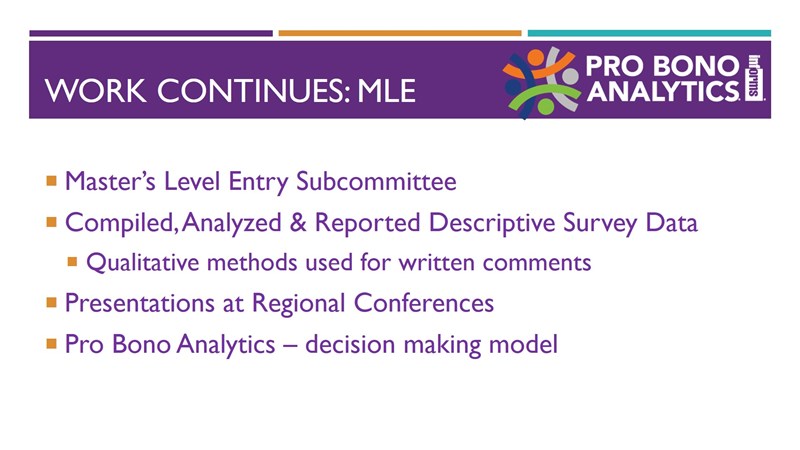
Slide 21: Cultural Competence
To grow and thrive in a diverse world, work is being done by the new Diversity and Multiculturalism Committee. At the 2016 Annual Conference, panelists Marisol Norris, Susan Hadley, Demeko Freeman, Sandra Ramos-Watt, Mike Viega, MingYaun Low and Jessica Fletcher led a captivated audience in conversations about race. In December, a special focus issue of Music Therapy Perspectives was published on the topic of Multicultural Musical Competence. Members of the Board of Directors have continued the conversation on race and music therapy, noting the need for increased cultural awareness and competence in our profession. We look forward to providing information to our members and the public to provide better quality music therapy services as practitioners, and promote increased awareness with our peers and clients.
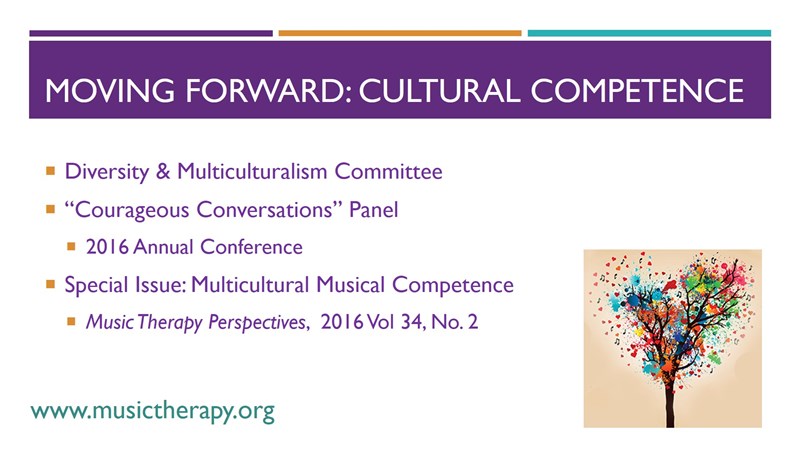
Slide 22: Sustainability Planning
Since 2014, the AMTA Board of Directors has been looking at moving the Association forward through upcoming transitions. We have been fortunate to have a stable office staff team for nearly two decades and an Executive Director who has served us for over 28 years. The Board continues to prepare for eventual transitions using knowledge based governance when it comes to decision making. Significant time will be dedicated at the Board’s Mid-Year meeting on the topic of sustainability planning.
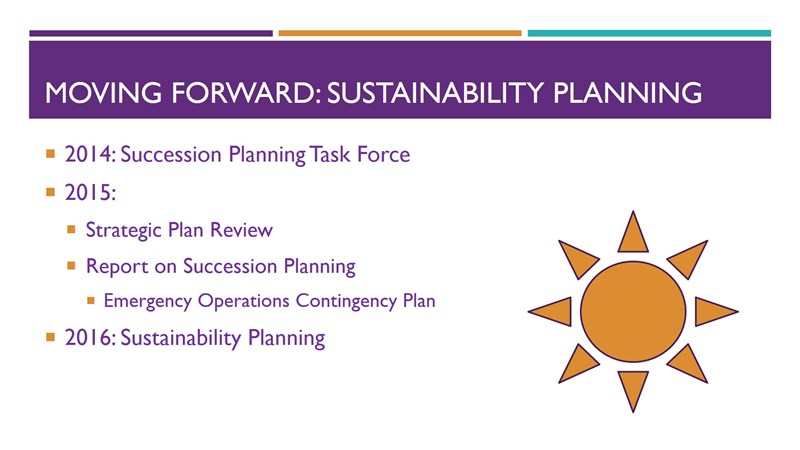
Slide 23: AMTA 17
Mark your calendars for this year’s annual conference in St. Louis: “A Mindful Approach to Music Therapy.” Among the new offerings will be TedX-type presentations with brief lectures by experts on a topic of focus. See more information in the conference proposal form. Proposals are due on April 3rd for CMTEs, Specialized Trainings and Institutes and on April 10th for Concurrent Sessions.
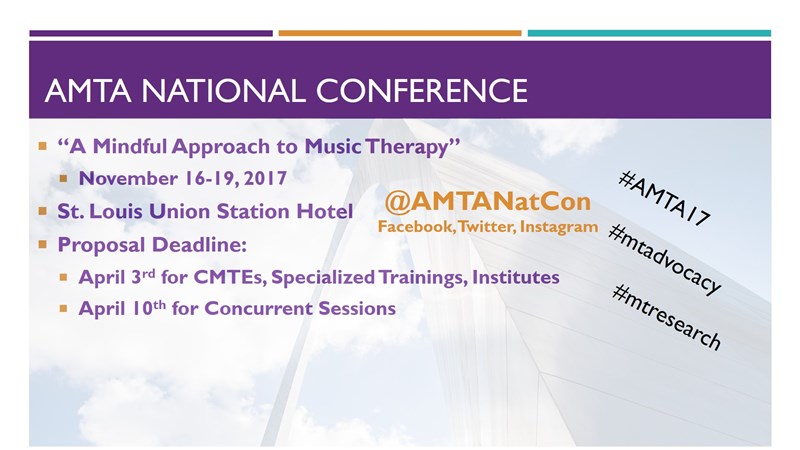
Slide 24: Connecting
You may have noticed an increased presence on social media: Kim Bell is AMTA’s new Social Media Coordinator. Find AMTA on Facebook and Twitter; the journals there and on Instagram; AMTA National Conference (AMTANatCon) and AMTAS on all the above.
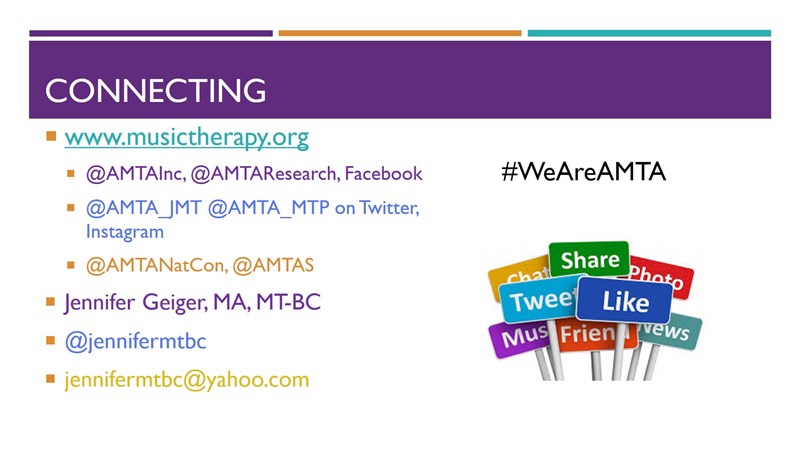
When people ask “What does AMTA do for me?” the answer is simple: AMTA advocates for music therapists and their clients on a regular basis in ways in which we cannot do alone. Without the work of AMTA – without the work that WE do together – we would not be in the profession that we are passionate about. Your dedicated service is meaningful and valuable, so is your membership and direct support. Thank you for the investment that you are making on behalf of the profession and our clients. It is an honor to serve alongside you. Working together, to benefit the music therapy profession, WE are AMTA.
Back